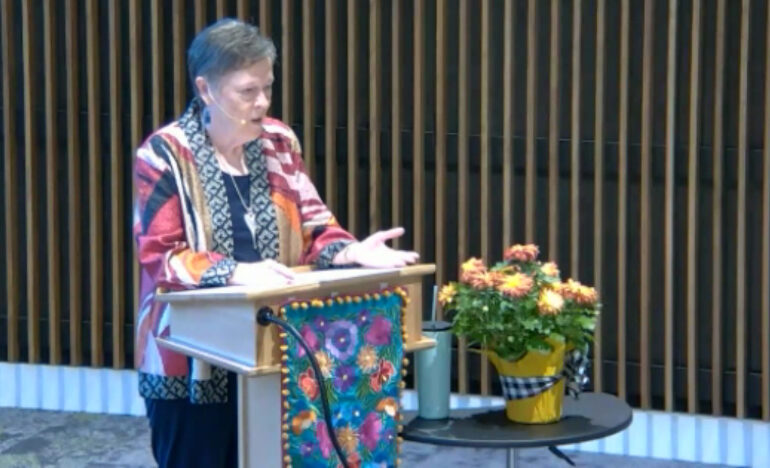Cultivating Peace in our Hearts: The Urgency of Prayer

By Kathy Keary
Part 5. Read all the parts here.
The urgency of prayer is the “first characteristic of the work of peacemaking,” Henri Nouwen asserts in his book, The Road to Peace. He elaborates: “Prayer is the basis of all peacemaking precisely because in prayer we come to the realization that we do not belong to the world in which conflicts and wars take place, but to him who offer us his peace.” In our last article, we referenced the many prayer practices found in the Christian tradition that promote peace of heart though discursive and nondiscursive meditation.
In his book, Open Heart, Clear Mind, Thubten Chodron speaks of two types of meditation in the Buddhist tradition: one that results in samatha, or calm abiding, and one that leads to vipassana, or special insight. We refer you to our previous article for a review of meditation aimed at achieving the state of calm abiding.
Special insight is gained by analytical meditation. Chodron emphasizes that this type of meditation does not involve getting lost in mental chatter. The purpose is to gain an understanding of the object of the meditation in order to fully experience it and arrive at a non-conceptual experience. Chodron explains this by referring to the words of the Buddha:
Just as fire arises when two pieces of wood are rubbed against each other, so analytical wisdom arises from the conceptual state. And just as the fire increases and burns away all the wood, analytical wisdom increases and burns away all conceptual states.
Chodron categorizes analytical meditation in two categories: one in which the purpose is to transform our attitudes and the other is to understand and perceive the object of meditation. He offers examples of both.
In the first instance, he speaks about meditating on love. The object of the meditation is other people. We consider the kindness they have extended to us. We reflect on the reality that everyone wants to experience happiness and avoid suffering as much as we do. We then reflect on how awesome it would be if they could truly own happiness. As these ideas are strengthened through reflection, we find that our minds are filled with an unbiased and penetrating love for all people. A deep experience of love is maintained through stabilizing mediation that results in calm abiding.
Note: Never miss an article published on the Renewal Center website: Sign up to receive our newsletters
In the second instance, Chodron discusses a meditation on impermanence. As we analyze this topic, we come to an understanding of the changing nature of the world. Coming to a deep understanding of the transient nature of our world leads to an avoidance of attachment and the pain that comes with it. We enjoy things while they last but will not grieve when they disappear. The effect is a calming of mental turmoil in our daily life.
Chodron emphasizes the need for both calm abiding and analytical meditation. Analytical mediation cuts the root of ignorance. Calm abiding allows our mediation to have a deep mental impact completely abolishing ignorance. He asserts: “When we’ve conjoined calm abiding and special insight, then we’re firmly on the path to freedom.”
New articles in this series are posted to the website every Monday. The full series can be found here: An Invitation to Something New: The Contemplative Life. On Thursday’s we’ll send an email to remind you of the articles.
Another form of meditation, mindfulness, has its roots in Buddhism but has found its way into the mainstream of American life. This practice involves intentionally focusing one’s attention on the present moment accepting it without judgment. Terry Cortes-Vega elaborates in her book, Buddhism for Healing: Practical Meditations, Mantras, and Rituals for Balance and Harmony.
When you are mindful, you are fully engaged in what you are doing, able to better enjoy the pleasant things in life, and more equipped to deal with unpleasant people and events. When you live mindfully, you are less likely to get caught up in things from the past that may spur regret or things within the future that may upset you, and you are better able to form deep connections with others in the present … With the regular practice of mindfulness, you can become more joyful, relaxed, and stable.
Meditation in both the Christian and Buddhist traditions results in an inner peace that becomes the impetus for one’s words and actions. Instead of reacting to life from a place of anger, the practice of meditation promotes an approach to life grounded in a spirit of love and peace. Not only does the practitioner experience a sense of well-being, but meditation also encourages a heartfelt concern for others.
Meditation is a welcome guest in our world today. Widespread practice of it may lead to the calming of the unrest we find prevalent in the world today.
References
Chodron, Thubten. Open Heart, Clear Mind: An Introduction to the Buddha’s Teachings. Boston, Massachusetts: Snow Lion Publications, 1990.
Cortes-Vega, Terry. Buddhism for Healing: Practical Meditations, Mantras, and Rituals for Balance and Harmony. Emeryville, California: Rockridge Press, 2020.
Nouwen, Henri. The Road to Peace. Maryknoll, New York: Orbis Books, 1998.
[Kathy Keary, a Precious Blood Companion and spiritual director, holds a master’s degree in theological studies and is a graduate of the Atchison Benedictine’s Sophia Center’s Souljourners Program, an intense study of spirituality and spiritual direction. Kathy believes that the divine is present and active in all of life and encourages others to be awakened to the God in all including the divine within. She enjoys accompanying others on their journey to wholeness discovering the person they were created to be.]
Image by Charles Nambasi from Pixabay
We’d Like to Hear From You!
We’d like to know what you think about this article. Send us a comment using the form below. Do you have a suggestion? Is there something you want to learn more about? Send us a note.
Related

Discover Lectio Divina
Presented by Kathy Keary
This is a recording of “Discover Lectio Divina” presented by Kathy Keary at Precious Blood Renewal Center in Liberty, Missouri, on Oct. 2, 2025.

Do You Hear What I Hear?
By Fr. Garry Richmeier, C.PP.S.
How can we avoid the harmful affects of the polarization that characterizes so much of our lives these days? One step toward this end is to cultivate a greater understanding and appreciation for the idea of relativity in human behavior.
Categories
Assembling God's Puzzle Coffee with Padre Cooking & Spirituality Encounters of the 4th Kind Family Matters Guided Meditations Reflections on the Eucharsitic Prayers Spiritual Resources Taize Prayers Teach Us to Pray The Contemplative Life Traveling with Pilgrims of Hope Uncategorized Videos Week of Prayer for Christian Unity When you need a little help
